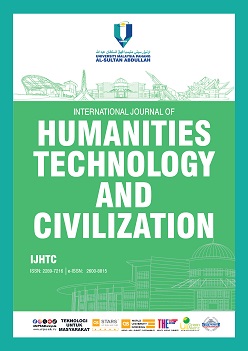THE EFFECTS OF DIMENSIONS OF SHOPPING-LIFE BALANCE ON THE DIGITAL CONSUMER HAPPINESS IN MALAYSIA THROUGH THE MEDIATION OF SHOPPING SATISFACTION
DOI:
https://doi.org/10.15282/ijhtc.v10i1.11488Keywords:
Shopping-Life Balance, Shopping Satisfaction, Consumer Happiness, Digital Platform, Malaysian ConsumerAbstract
This research aims to examine the effect of the shopping-life balance dimensions (shopping engagement and role conflict) on shopping satisfaction, the effect of shopping-life balance dimensions and shopping satisfaction on consumer happiness, and the mediating effect of shopping satisfaction in the relationship between shopping-life balance and consumer happiness. Bottom-up spillover theory of life satisfaction was applied to test the proposed research framework. Using the survey method, responses of 384 respondents of digital shoppers from various digital platform were choosing through the quota sampling. The data were collected through online questionnaire of consumers shopping on various digital trading platforms using Google Form. Descriptive analysis through Statistical Packages for The Social Science (SPSS) was used to summarize respondent data, while Structural Equation Modelling (SEM) through Analysis of Moment Structures (AMOS) was used to test the research hypotheses. The findings revealed that shopping engagement positively affects shopping satisfaction (b=0.767, p<0.001), while role conflict (b=0.057, p<0.001), were not significant affects shopping satisfaction. Additionally, shopping engagement (b=0.371, p<0.001)), role conflict and shopping satisfaction positively affect consumer happiness. Furthermore, shopping satisfaction acts as a partial mediator in the relationship between shopping engagement and consumer happiness (b=0.628, p<0.001), while shopping satisfaction does not mediate the effect of role conflict on consumer happiness. In conclusion, shopping-life balance is important in ensuring shopping satisfaction and consumer happiness. The implication shown, in order to achieve consumer happiness, shopping engagement must be at an optimum level by minimizing role conflict, which in turn affects the level of shopping satisfaction.
References
Ahmed, A., Naseer, R., Asadullah, M., & Khan, H. (2020). Managing service quality, food quality, price fairness and customer retention: A holistic perspective. Annals of Contemporary Developments in Management & HR, 2(1), 1–5.
Altinay, L., Song, H., Madanoglu, M., & Wang, X. L. (2019). The influence of customer-to-customer interactions on elderly consumers’ satisfaction and social well-being. International Journal of Hospitality Management, 78, 223–233.
Andrews, F., & Withey, S. (1976). Social Indicators of Well-Being: American Perceptions of Quality of Life. Social Indicators of Well-Being. New York: Plenum Press.
Arnold, M. J., & Reynolds, K. E. (2012). Approach and avoidance motivation: Investigating hedonic consumption in a retail setting. Journal of Retailing, 88(3), 399-411.
Murad, A. (2022). e-Dagang Kekal Prestasi Selepas Pembukaan Sektor Ekonomi Negara. Astro Awani. Retrived from https://www.astroawani.com/berita-bisnes/edagang-kekal-prestasi-selepas-pembukaan-sektor-ekonomi-negara-365641
Aziz, M. A. (2022, April 18). Pembelian Dalam Talian Semakin Jadi Pilihan Pengguna. Berita Harian. Retrived from https://www.bharian.com.my/bisnes/lain-lain/2022/04/947141/pembelian-dalam-talian-semakin-jadi-pilihan-pengguna
Bhattacharjee, A., & Mogilner, C. (2014). Happiness from ordinary and extraordinary experiences. Journal of Consumer Research, 41(1), 1–17.
Brown, K. W., Kasser, T., Ryan, R. M., & Konow, J. (2016). Materialism, spending, and affect: An event-sampling study of marketplace behavior and its affective costs. Journal of Happiness Studies, 17, 2277–2292.
Campbell, A., Converse, P. E., & Rodgers, W. L. (1976). The quality of American life: Perceptions, evaluations, and satisfaction. New York: Russell Sage Foundation.
Department of Statistics Malaysia. (2021). Retrieved from https://www.dosm.gov.my/
Desmeules, R. (2002). The impact of variety on consumer happiness: Marketing and the tyranny of freedom. Academy of Marketing Science Review, 2002(12), 1–18.
Ekici, A., Joseph Sirgy, M., Lee, D. J., Yu, G. B., & Bosnjak, M. (2018). The effects of shopping well-being and shopping ill-being on consumer life satisfaction. Applied Research in Quality of Life, 13, 333–353.
Fatima, J. K., Di Mascio, R., & Sharma, P. (2020). Demystifying the impact of self-indulgence and self-control on customer-employee rapport and customer happiness. Journal of Retailing and Consumer Services, 53.
Fazal-E-Hasan, S. M., Ahmadi, H., Mortimer, G., Lings, I., Kelly, L., & Kim, H. (2020). Online repurchasing: The role of information disclosure, hope, and goal attainment. Journal of Consumer Affairs, 54(1), 198-226.
Ferreira, F., & Barbosa, B. (2017). Consumers’ attitude toward Facebook advertising. International Journal of Electronic Marketing and Retailing, 8(1), 45–57.
Gilovich, T., Kumar, A., & Jampol, L. (2015). A wonderful life: Experiential consumption and the pursuit of happiness. Journal of Consumer Psychology, 25(1), 152–165.
Grzeskowiak, S., Sirgy, M.J., Foscht, T. and Swoboda, B. (2016). Linking Retailing Experiences with Life Satisfaction: The Concept of Story-Type Congruity with Shopper’s Identity. International Journal of Retail & Distribution Management, 44 (2) 124-138.
Harris, P. (2017). Multichannel shopping well-being: A narrative-based examination. Qualitative Market Research, 20(3), 354-369.
Horváth, C., & Adıgüzel, F. (2018). Shopping Enjoyment to the Extreme: Hedonic Shopping Motivations and Compulsive Buying in Developed and Emerging Markets. Journal of Business Research, 86, 300-310.
House, R. H., & Rizzo, J. R. (1972). Role conflict and ambiguity as critical variables in a model of organizational behavior. Organizational Behavior & Human Performance, 7(3), 467–505.
Ipsos Malaysia. (2022). Press Release: E-Commerce Landscape in A Reopened Economy.
Janio in-house survey. (2020). Retrieved from https://janio.asia/articles/ecommerce-online-shopping-malaysia-covid-19/
Jeff, F., Roberts, A., & Manolis, C. (2015). Adolescent Autonomy and the Impact of Family Structure on Materialism and Compulsive Buying. Journal of Marketing Theory and Practice, 14(4).
Joseph Sirgy, M. (2019). Promoting Quality-Of-Life and Well-Being Research in Hospitality and Tourism. Journal of Travel & Tourism Marketing, 36(1), 1-13.
Lee, D.-J., Yu, G. B., Sirgy, M. J., Ekici, A., Gurel-Atay, E., & Bahn, K. D. (2014). Shopping Well-Being and Ill-Being: Toward an Integrated Model. In Musso, F., & Druica, E. (Ed.), Handbook of Research on Retailer-Consumer Relationship Development (pp. 27-44). IGI Global.
Leong, S. M., Ang, S. H., Cote, J. A., Lee, Y. H., & Houston, M. J. (2016). What is consumer well-being to Asians? Social Indicators Research, 126, 777-793.
Leong, B. (2021). COVID-19’s Impact on Malaysia’s eCommerce Market. Retrieved from https://janio.asia/articles/-ecommerce-online-shopping-malaysia-covid-19/
Malaysian Communications and Multimedia Commission. (2020). Retrieved from https://www.malaysianwireless. com/2020-/04/mcmc-observed-high-internet-usage-in-malaysia-during-mco-period/
Mutz, M. (2016). Christmas and Subjective Well-Being: A Research Note. Applied Research in Quality of Life, 11(4), 1341–1356.
Nicolao, L., Irwin, J. R., & Goodman, J. K. (2009). Happiness for Sale: Do Experiential Purchases Make Consumers Happier than Material Purchases? Journal of Consumer Research, 36(2), 188–198.
Rakuten Insight (2020). The Next Normal - Covid-19 Consumer Survey 2020 SG & MY. Retrieved from https://insight.rakuten.com/the-next-normal-covid-19-consumer-survey-2020-sg-my/
Ridgway, N. M., Kukar-Kinney, M., & Monroe, K. B. (2008). An expanded conceptualisation and a new measure of compulsive buying. Journal of Consumer Research, 35(4), 622–639.
Roberts-Lombard, M. (2020). Antecedents and outcome of commitment in Islamic banking relationships–an emerging African market perspective. Journal of Islamic Marketing, 11(6), 1851-1871.
Sánchez Torres, J. A., Solé Moro, M. L., & Argila Irurita, A. M. (2018). Impact of gender on the acceptance of electronic word-of mouth (eWOM) information in Spain. Contaduría y Administración, 63(4), 1-19.
Schuler, R. S., Aldag, R. J., & Brief, A. P. (1977). Role Conflict and Ambiguity: A Scale Analysis. Organisational Behavior and Human Performance, 20(1), 111-128.
Shaban Abdelmoteleb, A. A., Kamarudin, S., & E Nohuddin, P. N. (2017). Data driven customer experience and the roadmap to deliver happiness. Marketing and Branding Research, 4, 236-248.
Shahzad, A., Chin, H. K., Altaf, M., & Bajwa, F. A. (2020). Malaysian SME's performance and the use of e-commerce: A multi-group analysis of click-and-mortar and pure-play e-retailers. Pakistan Journal of Commerce and Social Sciences, 14(1), 1-33.
Siddiqi, U. I., Sun, J., & Akhtar, N. (2020). Ulterior motives in peer and expert supplementary online reviews and consumers' perceived deception. Asia Pacific Journal of Marketing and Logistics, 33(1), 73-98.
Sirgy, M. J., Lee, D. J., Grace, B. Y., Gurel-Atay, E., Tidwell, J., & Ekici, A. (2016). Self-expressiveness in shopping. Journal of Retailing and Consumer Services, 30, 292-299.
Sirgy, M. J., Lee, D. J., & Yu, G. B. (2018). Shopping-Life Balance: Towards a Unifying Framework. Applied Research in Quality of Life, 15(1), 17-34.
Sirgy, M. J., & Lee, D. J. (2018). The Psychology of Life Balance. In E. Diener, S. Oishi, & L. Tay (Eds.), Handbook of Well-Being. DEF Publishers.
Soelton, M., Lestari, P. A., Arief, H., & Putra, R. L. (2020, February). The effect of role conflict and burnout toward turnover intention at software industries, work stress as moderating variables. In 4th International Conference on Management, Economics and Business (ICMEB 2019) (pp. 185-190). Atlantis Press.
Syahirah. (2020). Over two-thirds of Malaysians now more comfortable shopping online after Covid-19 — StanChart. Retrieved from https://www.theedgemarkets.com/article/over-twothirds-malaysians-now-more-comfortable-shopping-online-after-covid19-%E2%80%94-stanchart
Thürridl, C., Kamleitner, B., Ruzeviciute, R., Süssenbach, S., & Dickert, S. (2020). From happy consumption to possessive bonds: when positive affect increases psychological ownership for brands. Journal of Business Research, 107, 89–103.
Today, H. L. (2020). Uncharted territory: Legal experts weigh in on the COVID-19 outbreak. Retrieved from https://today.law.harvard.edu/roundup/uncharted-territory-legal-experts-weigh-in-on-the-covid-19-outbreak/
Vase.ai (2020). Consumer purchase behavior changes amidst. Retrieved from https://vase.ai/resources/malaysian- consumer-purchase-behaviour-changes-amidst-covid-19/%5C
Voydanoff, P. (2005). Toward a conceptualisation of perceived work–family fit and balance: A demands and resources approach. Journal of Marriage and Family, 67, 822–836.
Zhao, C., & Wei, H. (2019). The Highest Hierarchy of Consumption: A Literature Review of Consumer Well-Being. Open Journal of Social Sciences, 7(4), 135–149.
Zainol, Z. (2018). Structural Equation Modeling Using AMOS: A Step-by-Step Approach. Kuala Lumpur, Malaysia.
Downloads
Published
Issue
Section
License
Copyright (c) 2025 The Author(s)

This work is licensed under a Creative Commons Attribution-NonCommercial 4.0 International License.




